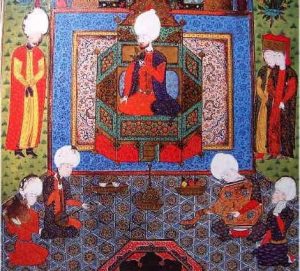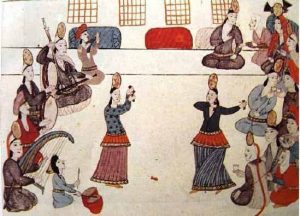MUHIBBI

Performed poetry after Suleiman the Magnificent
Throne of my lonely niche, my wealth, my love, my moonlight.
My most sincere friend, my confidant, my very existence, my Sultan, my one and only love.
The most beautiful among the beautiful …
My springtime, my merry faced love, my daytime, my sweetheart, laughing leaf …
My plants, my sweet, my rose, the one only who does not distress me in this room …
My Istanbul, my karaman, the earth of my Anatolia
My Badakhshan, my Baghdad and Khorasan
My woman of the beautiful hair, my love of the slanted brow, my love of eyes full of misery …
I’ll sing your praises always
I, lover of the tormented heart, Muhibbi of the eyes full of tears, I am happy.
Under his pen name Muhibbi, Sultan Suleiman composed this poem for his wife Hürrem Sultan. The miniatur dating from 1558 that depicts Sultan Suleiman with court musicians.
MUHIBBI (EN)
From the beginning to the end of the history of the Ottoman court, music had an important place within its everyday life. In the sixteenth century, all the genres performed at the court were traditional Turkish music, namely classical, dance, folk, military and religious. Classical music was performed in the presence of the sultan, in the „enderun“ and in the „harem“. Under Suleiman’s patronage, the Ottoman Empire entered the golden age of its cultural development. Hundreds of imperial artistic societies, called Ehl-i Hiref, were administered at the imperial seat, the Topkapi Palast. The Ehl-i Hiref attracted the empire’s most talented artisans to the Sultan’s court, both from the Islamic world and from the recently conquered territories in Europe, resulting in a blend of Arabic, Turkish and European cultures.
With his new work MUHIBBI, Istanbul born composer and director Burak Özdemir creates a musical journey through Sultan Suleiman’s personal and artistic life, commemorating his 500th anniversary of becoming the sultan of the Ottoman empire on 1520. Suleiman himself was an accomplished poet, writing in Persian and Turkish languages. Suleiman’s verses have become proverbs of the Turkish cultural heritage. For his project, Özdemir selects Ottoman court composers‘ forgotten pieces and integrates Suleiman’s enigmatic poetry into these musical scores. The literary art of Suleiman merges with the music of his court composers. This new approach conveys Suleiman’s poetry to be experienced in an unheard way.
MUHIBBI is performed by the baroque ensemble Musica Sequenza on authentic instruments of the 16th century. The traditional instruments of the Ottoman court music; ney flute, kanun and kudüm percussion are highlighted in the program. In 2014 Özdemir and ensemble Musica Sequenza have already recorded using these Turkish instruments for their fourth solo album „Rameau a la Turque“ (Deutsche Harmonia Mundi). Internationally toured program „Rameau a la Turque“ was Özdemir’s first production focusing on his homeland’s historical culture; where Jean Philippe Rameau’s ballet music was put in a dialogue with the music of the Ottoman court composer; Tanburi Mustafa Cavus.
Burak Özdemir and ensemble Musica Sequenza’s work mainly focuses on discovering forgotten treasures of the ancient centuries and display them in unique ways to today’s audiences worldwide.

ENSEMBLE MUSICA SEQUENZA
Burak Özdemir | composition & artistic director
Ludwig Obst | baritone
Tim Willis | baroque violin
Annie Gard | baroque violin
Chang Yoo | baroque viola
Linda Mantcheva | baroque cello
Mirjam Wittulski | contrabass
Charlie Zhang | oud
Ercan Irmak | ney flute
Asim Senocak | qanun
Cengiz Özdemir | percussion
Alessandro Seggioli | harpsichord
Daniel Mulder | creative director & visuals
Burcu Özdemir | costume
MUHIBBI (DE)
Musik hatte vom Beginn bis zum Ende der Geschichte des osmanischen Hofes einen wichtigen Stellenwert in seinem Alltag. Im sechzehnten Jahrhundert waren alle am Hof aufgeführten Genres traditionelle türkische Musik, nämlich klassische, Tanz-, Volks-, Militär- und religiöse. Klassische Musik wurde im Beisein des Sultans, im „Enderun“ und im „Harem“ aufgeführt. Unter der Schirmherrschaft von Suleiman trat das Osmanische Reich in das goldene Zeitalter seiner kulturellen Entwicklung ein. Hunderte kaiserliche Kunstvereine, genannt Ehl-i Hiref, wurden am kaiserlichen Sitz, dem Topkapi Palast, verwaltet. Der Ehl-i Hiref lockte die talentiertesten Handwerker des Imperiums an den Hof des Sultans, sowohl aus der islamischen Welt als auch aus den kürzlich eroberten Gebieten in Europa, was zu einer Mischung aus arabischer, türkischer und europäischer Kultur führte.
Mit seinem neuen Werk MUHIBBI schafft der in Istanbul geborene Komponist und Regisseur Burak Özdemir eine musikalische Reise durch Sultan Suleimans persönliches und künstlerisches Leben und erinnert an sein 500-jähriges Bestehen als Sultan des Osmanischen Reiches im Jahr 1520. Suleiman selbst war ein versierter Dichter, der auf Persischen und Türkischen Sprachen schrieb. Suleimans Verse gehören zu Sprichwörtern des türkischen Kulturerbes. Für sein Projekt wählt Özdemir vergessene Stücke der osmanischen Hofkomponisten aus und integriert Suleimans rätselhafte Poesie in diese Partituren. Die literarische Kunst von Suleiman verschmilzt mit der Musik seiner Hofkomponisten. Dieser neue Ansatz vermittelt die Poesie von Suleiman, die auf eine unerhörte Weise erlebt werden kann.
MUHIBBI wird vom Barockensemble Musica Sequenza auf authentischen Instrumenten des 16. Jahrhunderts aufgeführt. Die traditionellen Instrumente der osmanischen Hofmusik; die Bambusflöte Ney, der Kastenzither Kanun und der Kudüm Schlagzeug sind im Programm hervorgehoben. 2014 haben Özdemir und sein Ensemble mit diesen Instrumenten bereits für ihr viertes Soloalbum „Rameau a la Turque“ (Harmonia Mundi) aufgenommen. Das international tourende Projekt „Rameau a la Turque“ ist Özdemirs erste Produktion, die sich mit der historischen Kultur seiner Heimat befasst. Die Musik von Jean Philippe Rameau wurde mit Werken von osmanischem Hofkomponisten; Tanburi Mustafa Cavus im Dialoge gestellt.
Die Arbeit von Burak Özdemir und Ensemble Musica Sequenza konzentriert sich hauptsächlich darauf, vergessene Schätze der Antike neu zu entdecken und sie dem heutigen Publikum weltweit auf einzigartige Weise zu präsentieren.